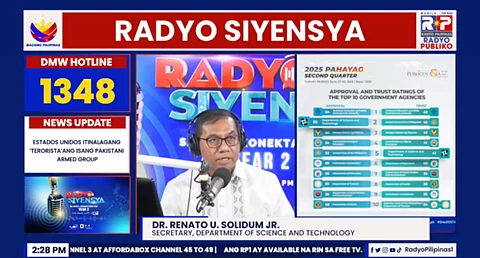
- NEWS
- the EDIT
- COMMENTARY
- BUSINESS
- LIFE
- SHOW
- ACTION
- GLOBAL GOALS
- SNAPS
- DYARYO TIRADA
- MORE

Science Secretary Renato Solidum Jr. on Friday laid out the accomplishments of the Department of Science and Technology (DOST), emphasizing the agency’s shift to a four-pillar strategy aligned with the UN’s Sustainable Development Goals.
In his “State of the DOST Address,” Solidum highlighted projects that bring science and innovation closer to the people — especially in remote and previously conflict-affected communities.
“Some may be simple interventions, but they significantly improve people’s lives because science, technology, and innovation lead to development,” Solidum said.
Among the projects he cited was the establishment of the first Bamboo Textile Fiber Innovation center in Mindanao, the deployment of coffee sorters to indigenous communities in Agusan del Norte, and the expansion of Project STARBOOKS, a digital library system to improve access to learning.
He said the agency is building an “innovation ecosystem” that brings research to market and supports local businesses and communities, including in geographically isolated and disadvantaged areas (GIDAs) and even in prisons.
Under the pillar of human well-being, the DOST supported over 46,000 undergraduate and 4,500 graduate STEM scholars, and backed efforts to strengthen local vaccine production through the proposed Virology and Vaccine Institute.
In education and health, the department expanded nutrition surveys and launched the Safe Drinking Water Treatment System and a desalination project for coastal towns.
On wealth creation, Solidum said 1,737 communities benefited from capacity-building programs like SETUP 4.0 and iFWD PH for OFWs, while textile and agriculture innovations boosted local livelihoods.
For wealth protection, he noted major investments in disaster forecasting tools, AI-based weather prediction, and new mobile disaster command vehicles. The PHIVOLCS Modernization Law, signed in April 2025, is also expected to boost the country’s disaster resilience.
The fourth pillar, sustainability, saw the launch of a fuel-efficient floating waste collector, and continued promotion of clean technologies and smart systems. Solidum also cited DOST’s efforts in quantum computing, smart agriculture, and circular economy initiatives.
Internationally, the DOST received 34 awards, signed over 25 research agreements, and launched new initiatives like the PROPEL Program and upcoming “JuanaKNOW” AI chatbot to assist innovators.
Solidum also celebrated high public trust in the DOST, citing a Publicus Asia survey ranking the agency as second most approved government department in 2025.
“Despite R&D being high-risk, we pursue it with determination—believing that science and innovation are crucial for nation-building,” Solidum said.
